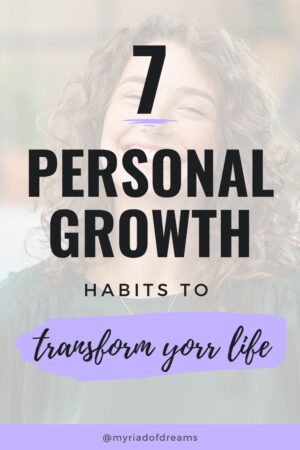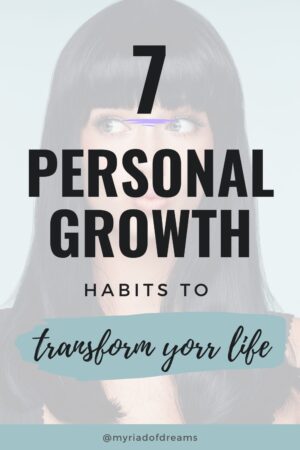
In a fast-paced world that constantly demands more — more productivity, more success, more perfection — it’s easy to lose touch with what really matters: your personal growth.
Personal growth isn’t about achieving an unrealistic ideal or transforming into someone else. It’s about becoming more aligned with your core values, expanding your mindset, and intentionally evolving into a healthier, stronger version of yourself — mentally, emotionally, and spiritually.
The good news? It doesn’t take a complete life overhaul to start changing your life. Small, consistent habits practiced daily or weekly can lead to massive transformation over time.
Below are 7 personal growth habits that have the power to shift how you think, live, and show up in the world.

1. Start Your Day with 10 Minutes of Intentional Reflection
The first few minutes of your day are sacred. They influence your mindset, energy levels, and decision-making for the rest of the day. That’s why intentional morning reflection is one of the most powerful habits you can build.
You don’t need a full-blown 2-hour morning routine. Just 10 minutes of quiet time with yourself can ground you and help you start with clarity and calm instead of chaos.
- Journaling: Use prompts like “What do I need today?” or “How do I want to feel by the end of the day?”
- Gratitude Practice: Write down 3 things you’re grateful for — studies show this can improve mood and reduce anxiety.
- Mindful Breathing: Take 10 deep breaths before you touch your phone or check social media.
This habit boosts your emotional self-awareness, reduces reactivity, and helps you make better choices throughout the day. It’s the foundation for building intentional, aligned action — which is at the heart of personal growth.
2. Practice Regular Digital Detoxes
Digital overstimulation is one of the most overlooked barriers to personal growth. The average person spends 7+ hours a day in front of a screen, constantly consuming content, notifications, and distractions. While technology is a powerful tool, it can also become a silent saboteur of focus, creativity, and self-awareness.
A digital detox is a deliberate break from digital devices — especially social media and non-essential screen time — to reconnect with the present moment and your inner world.
- Set Digital Boundaries: Choose specific hours of the day to stay offline — such as after 8 PM or the first hour after waking.
- No-Phone Zones: Keep your phone out of the bedroom or away from the dinner table.
- Scheduled Detox Days: Try a weekly “offline morning” or “social media-free Sunday.”
Stepping away from screens regularly helps reclaim mental clarity, reduce comparison and anxiety, and gives your brain the space it needs to think deeply, reflect, and reset.
3. Set Monthly Goals with a System for Reflection
Goal-setting is a cornerstone of growth — but it’s often done wrong. People set vague, unrealistic goals and then feel defeated when they don’t follow through. True personal growth comes from setting clear, intentional goals that align with your values, and then creating systems to reflect on your progress.
- Choose 3 goals per month: One for personal growth, one for wellness, and one for fun.
- Make them specific and measurable: Instead of “read more,” try “finish 2 books this month.”
- Review at month’s end: Ask yourself, “What worked? What didn’t? What do I want to adjust?”
To stay organized and track your progress effectively, consider using a bullet journal or a structured paper planner where you can visually map out your goals and reflect on them regularly. If you prefer digital organization, platforms like Notion or Trello can help you plan, organize, and monitor your progress with ease. You can also use monthly reflection templates — either printable or digital — to review what worked, what didn’t, and how you can improve moving forward.
Setting monthly goals provides clarity, momentum, and motivation. Reflecting on them builds self-trust and emotional intelligence — two of the most important traits for long-term personal development.
4. Consume Intentional, Uplifting Content Daily
The content you consume plays a significant role in shaping your thoughts, beliefs, and overall mindset. If you’re serious about personal growth, it’s essential to be intentional about what you expose yourself to each day. Rather than mindlessly scrolling through social media or watching random shows, choose content that educates, motivates, or challenges your thinking.
One great way to do this is by listening to personal development podcasts during your daily commute or while you’re doing household chores. Podcasts like The Mindset Mentor, On Purpose with Jay Shetty, and The Daily Stoic can introduce new perspectives and provide valuable insights to help you grow. Reading books that promote self-improvement, like Atomic Habits by James Clear or The Mountain Is You by Brianna Wiest, is another powerful way to feed your mind with useful, actionable information.
By replacing passive content consumption with purposeful media that aligns with your goals, you’ll find yourself constantly learning, growing, and refining your mindset. Small changes in the type of content you absorb can lead to profound shifts in your personal development journey.
5. Learn to Say “No” Without Guilt
Personal growth is as much about eliminating distractions as it is about adding new habits. One of the most powerful ways to do this is learning to say “no” — without guilt, without apology, and without fear of judgment.
Too many people say yes out of obligation, people-pleasing, or fear of missing out. But every time you say yes to something misaligned, you’re saying no to your own time, energy, and well-being.
Practice Saying No To:
- Invitations that drain you
- Work you can delegate
- Conversations that feel toxic
- Things that don’t align with your long-term vision
“No” is not rejection — it’s redirection toward your highest self.
Setting boundaries frees up emotional energy and gives you the space to focus on what truly matters. It’s one of the most courageous and necessary steps in any personal growth journey.
6. Schedule Solo Time (and Actually Enjoy It)
We live in a hyper-connected world, but real growth often happens in solitude. One of the most powerful habits you can develop is spending intentional time alone. It may sound counterintuitive — especially in a society that often glorifies busyness and connection — but carving out regular solo time is essential for deep personal growth.
Spending time alone doesn’t mean feeling lonely or disconnected from the world. Instead, it’s about intentionally choosing to spend time in your own company, doing activities that nurture your mind, body, and soul. This habit allows you to reconnect with your inner self, reflect on your thoughts, and make more mindful decisions about your life. Whether it’s a walk in the park, a quiet morning with a book, or simply sitting in silence, these moments of solitude offer a chance to recharge and gain perspective.
Solo time also promotes self-awareness and self-trust. When you’re alone, you’re forced to listen to your thoughts, desires, and feelings. This space helps you clarify your values, identify what truly matters to you, and reconnect with your passions. Without the external noise and distractions of others, you can better tune in to what you need to live authentically and with purpose.
This practice of solitude fosters confidence and independence, which are cornerstones of personal growth. When you spend time by yourself, you start learning to rely on your own judgment, trusting your instincts, and enjoying your own company. Over time, this leads to a deeper sense of emotional resilience. You’re less likely to seek validation or approval from others, and more likely to make choices that align with your true desires and needs.
7. Identify and Rewrite Limiting Beliefs
One of the most profound aspects of personal growth involves examining the beliefs you hold about yourself and the world. Limiting beliefs are the unconscious, self-imposed barriers that dictate your actions, your decisions, and your potential. These beliefs can come from childhood experiences, past failures, societal conditioning, or the expectations of others. While they may have once served a purpose, often protecting you from failure or discomfort, they now limit your ability to move forward and reach your full potential.
These beliefs are powerful — they shape how you view your capabilities, how you show up in relationships, and how you approach opportunities. But the truth is, they are not facts. They are stories you’ve told yourself, often without even realizing it. The key to breaking through these limitations is to first identify them and then actively rewrite them into empowering, supportive beliefs that serve your growth and future success.
Examples of limiting beliefs:
- “I’m not good enough.”
- “I always fail.”
- “I don’t deserve success.”
- “People won’t take me seriously.”
Rewriting these beliefs involves replacing them with affirmations or empowering statements that better reflect your true potential and your ability to grow. For example:
- Limiting belief: “I’m not good enough to succeed.”
- Rewritten belief: “I am capable of learning and growing every day, and success comes from consistent effort, not perfection.”
The key to rewriting your limiting beliefs is repetition. Just like negative beliefs become ingrained over time, so do positive, empowering thoughts. You must reinforce your new beliefs daily, integrating them into your routine so they become your default mindset.
Over time, this practice will not only improve how you think about yourself but also how you approach challenges, setbacks, and opportunities. As you continue to rewrite your beliefs, you’ll find yourself taking more action, making bolder decisions, and stepping into a more empowered version of yourself. Your growth will no longer be confined by the stories you once told yourself about your limitations.
Final Thoughts
Personal growth doesn’t come from consuming more content, checking more boxes, or chasing perfection. It comes from intentional choices, daily habits, and a willingness to evolve — even when it’s uncomfortable.
The habits shared above aren’t magic fixes. But when practiced consistently over the course of a year, they can truly reshape your mindset, strengthen your self-worth, and create a more meaningful, fulfilling life.
You don’t have to do them all at once. Just start with one.

